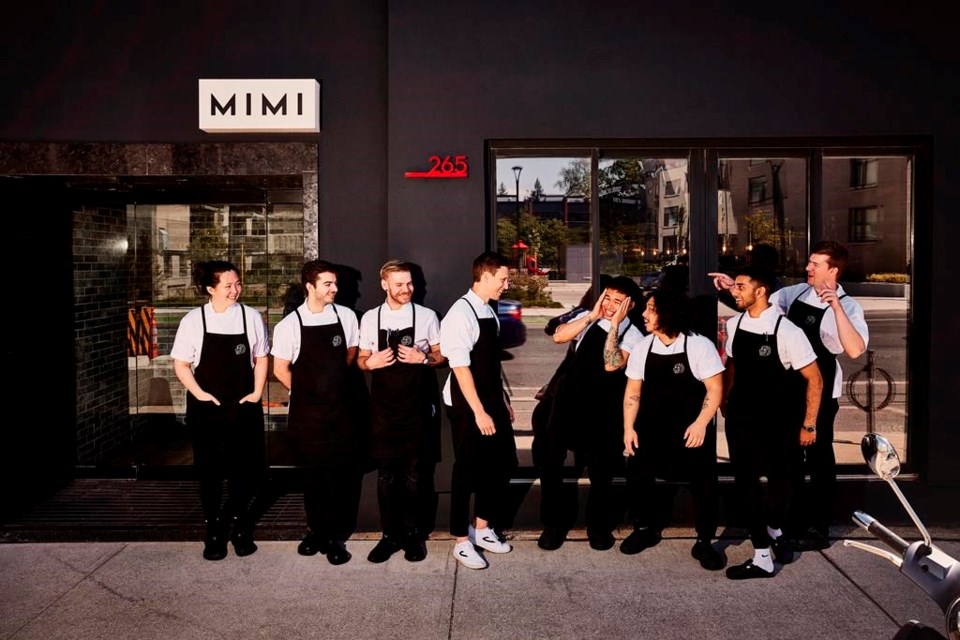TORONTO — A ranking of the country’s best new restaurants highlights several eateries that are touting efforts to address long-standing complaints about the sector's oft-poor labour and wage standards.
Air Canada’s annual Top 10 list returned Tuesday with its first in-person gala since 2019 and the COVID-19 containment measures that followed in early 2020.
This year’s roster for the airline’s enRoute magazine highlights restaurateurs who survived lockdowns and capacity caps to successfully open new eateries between late spring 2021 and June 2022.
Ranked first is Toronto’s Restaurant 20 Victoria, followed by Montreal’s Mastard and Toronto’s Mimi Chinese — three establishments that say the pandemic laid bare long-simmering staff demands for better work/life balance, and that they are heeding the call.
Mastard's chef and co-owner Simon Mathys says his restaurant is closed on weekends to allow staff "family time," while the teams behind Restaurant 20 Victoria and Mimi Chinese each say they put their staff on a four-day work week and offer health benefits.
"We put a lot of effort into making sure that our kitchen is a place that's a bit healthier and enjoyable and a space where people get paid a fair and livable wage," says David Schwartz, executive chef and co-owner of Big Hug Hospitality, which runs Mimi Chinese.
"All of these things should be standard. They are standard for us and I applaud those around us who are doing the same and I'm excited by the fact that more and more restaurant operators are starting to behave this way."
Restaurant critic Nancy Matsumoto, who anonymously visited more than 30 restaurants in 17 cities to compile the list, notes more successful establishments are more likely to have the resourcesto follow through on these ambitions but she expects it could help spur broader change.
Generally speaking, she detects a greater understanding among chefs and owners of the need to protect the mental health of their staff.
"A lot of, I think, the really successful places are going to something like a four-day work week, giving full benefits, giving sort of staff development opportunities, things that are going to make it easier to retain staff," Matsumoto says in a recent interview from New York, where she splits her time with Toronto.
"I mean, it's not that easy for your bottom line but I think people are realizing that in order to have a really happy workplace, this is the way it has to be and the way it should be."
She adds that workplace conditions did not factor into whether a restaurant placed on the list, nor where they ranked.
Other trends she spotted were a focus on sustainability and no-waste practices, such as Quebec City's 10th-placed Restaurant Alentours which says it sources most ingredients within 150 kilometres; and a theatrical-like ambience to transport diners such as Calgary's eighth-placed entry Major Tom with its panoramic views and glamorous cocktail menu and Mimi Chinese's nightclub-like atmosphere with servers in white starched dress shirts and bow ties.
"It's like a casino basically. You walk in, you lose sense of space and time. There are no windows," Schwartz says of Mimi Chinese, which leans toward southern Chinese fare.
The rest of the list spans the country and goes beyond pricey fine dining, says Matsumoto, pointing to the more casual entries of Một Tô — a fifth-placed family-run Vietnamese restaurant in Calgary — and the Toronto taco joint Fonda Balam, in seventh place.
There was no list in 2020, and in 2021 Air Canada awarded prizes in specific categories instead of a ranked Top 10.
Matsumoto says she was impressed by how well Canadian restaurants have adapted to hurdles of the past three years, although she acknowledged that many did not survive. One restaurant she had hoped to include in a long list of 30 eateries closed just one month before the August announcement.
"But I think those that have (survived) have gotten stronger, have figured out all kinds of clever pivots and are still innovating and really just completely dedicated to serving people good food, and making it work for them," she says.
"It's not easy, especially when you consider all of the supply chain issues, and now inflation, and huge labour shortages that people are dealing with."
Matsumoto admits to worrying that a feared resurgence of COVID-19 infections and restrictions this fall and winter could derail efforts at a restaurant comeback.
She senses a pent-up demand among foodies has buoyed many of the new eateries that emerged during the pandemic.
"When I go out places are packed. They're really boisterous and joyful. I think people are loving being out in restaurants."
Air Canada's list of best new restaurants:
1. Restaurant 20 Victoria, Toronto
2. Mastard, Montreal
3. Mimi Chinese, Toronto
4. Perch, Ottawa
5. Một Tô, Calgary
6. Hearts Tavern & Bar, Kimberley, Ont.
7. Fonda Balam, Toronto
8. Major Tom, Calgary
9. Fox & Monocle, North Saanich, B.C.
10. Restaurant Alentours, Quebec City, Que.
This report by The Canadian Press was first published Nov. 1, 2022.
Cassandra Szklarski, The Canadian Press



